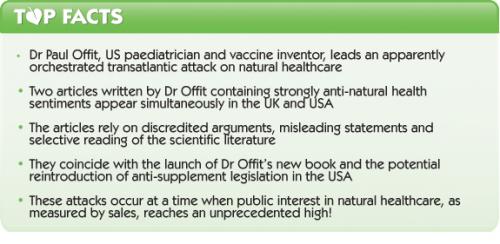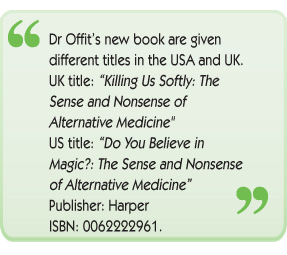Two articles, published almost simultaneously in the UK and USA, aim both barrels of skeptical and – apparently – scientific ire at various forms of natural healthcare. Written by Dr Paul Offit, the articles coincide not only with Dr Offit’s book launch but also with proposed US anti-supplement legislation. Join us as we separate fact from fiction, in the unsavoury world that Dr Offit and others dish up to the public they believe must be steered away from natural healthcare.

Vitamin E studies back from the depths
The UK Guardian article is more comprehensive and covers everything in the New York Times op-ed, so our comments will address that piece exclusively.
Vitamin E is a cause célèbre among those suspicious of the scientific credentials of vitamin supplements. The reason, as Offit’s article reinforces, is clear: several studies and meta-analyses have returned negative results for vitamin E supplementation, and some have even indicated that it increases mortality risk.
Dr Offit points to a 2005 meta-analysis (study of studies) published in the Annals of Internal Medicine and a randomised trial in JAMA, which, respectively, looked at vitamin E supplementation’s effects on all-cause mortality and cardiovascular events and cancer. All trials used isolated, purified or synthetic forms of a single isomer of vitamin E – namely α-tocopherol – and not the naturally occurring forms. In nature, vitamin E occurs as a complex of four tocopherol isomers and a further four isomers of tocotrienol, in which gamma-tocopherol is generally the most abundant isomer, as well as a powerful natural antioxidant. We’ve covered the Ann Intern Med article in detail before, but this and similar trials are regularly used as ‘evidence’ when there’s a bit of vitamin-bashing to be done.
Asking the wrong questions on antioxidants
Goran Bjelakovic, of the University of Nis in Serbia, appears to not to like antioxidants – or at least research on them. Rather like Dr Offit, he believes that, “Antioxidant supplements need to be considered as medicinal products and should undergo sufficient evaluation before marketing”. Whether he reached this conclusion before or after writing several highly negative meta-analyses of antioxidants is a mystery, and not one that Dr Offit appears to have contemplated: he used two Bjelakovic papers to advance his case that antioxidants are at best useless, and at worst harmful.
That’s not a problem if the author’s methodology is sound, of course. But it isn’t. Bjelakovic specialises in meta-analyses in which he re-examines trials of a very narrow range of antioxidants: namely, vitamins A, C and E, beta-carotene and selenium. In so doing, he ignores numerous studies of more effective, plant-based antioxidants, such as curcumin (from turmeric), polyphenols and anthocyanins (from berry fruits) and coenzyme Q10 (from oily fish, organ meats, etc). He also further entrenches the error made in the interpretation of the vitamin E science mentioned above, by including studies of synthetic beta-carotene and a single vitamin E isomer, α-tocopherol, that appear to have been designed to fail. Furthermore, some of the trials evaluated in Bjelakovic’ meta-analyses also use vitamins at such high doses that it is likely that the antioxidant effects occurring within normal dose ranges would have been converted to pro-oxidant effects.

Selective use of the evidence
Nowhere does Dr Offit find space to mention a single piece of scientific evidence in favour of a single vitamin or antioxidant. When one considers how extensive this literature is in the case of resveratrol and curcumin for joint health, to take just two examples and one indication, the bias in Dr Offit’s article becomes crystal clear. And yet, based on his incredibly selective reading of the literature, he confidently proclaims: “The data is clear [sic]: high doses of vitamins and supplements increase the risk of heart disease and cancer”.
Turning the crosshairs on herbal medicine
Next on Dr Offit’s hit list is herbal medicine. “Blue cohosh [Caulophyllum thalictroides] can cause heart failure,” he says, pointing to a single case study of heart failure in a newborn whose mother had taken blue cohosh during pregnancy. We shudder to think of the skeptical reaction if an herbal medicine advocate tried to buttress his or her case that pharmaceuticals are deadly by pointing to individual case studies. But when it’s a skeptic making the case against herbs, it’s OK for the Guardian, apparently.
Elsewhere, Offit names some exotic side effects of herbal medicine, without providing a single reference. He also can’t resist bringing up the ‘Aristolochia case’ as evidence for herbal medicine’s dangers. This regrettable fiasco, created entirely by medical doctors in a Belgian slimming clinic working outside their field of expertise and with products about which they were insufficiently knowledgeable, was a failure of mainstream medicine – not herbal medicine.
Deception and depression
Offit’s attacks on St John’s wort (Hypericum perforatum) and milk thistle (Silybum marianum) are completely unfounded and appear bizarre in the face of the available scientific evidence. He dismisses the former’s utility for depression based on a clinical trial from 2002, when a recent Cochrane meta-analysis of 37 studies found Hypericum to be as effective as citalopram. It’s not the first time Cochrane has come out in favour of St John’s wort, either.
Offit declares milk thistle entirely useless based on a single, unpublished trial in hepatitis C; Cochrane has previously bemoaned the lack of decent research in this area, while Offit ignores milk thistle’s many uses beyond hepatitis C and the excellent clinical results achieved by generations of herbalists. It's also unclear if the unpublished trial in question used the same patient population as another trial by the same investigators. In this latter trial, the patients had previously been unsuccessfully treated with interferon therapy – making them a particularly sick, high-risk and unresponsive group. Set up to fail, perhaps?
St John’s wort has never been well regarded by pharma companies, who see it as a threat to the highly lucrative selective serotonin reuptake inhibitor (SSRI) market. Milk thistle and acetylcysteine, both natural products widely available as supplements, remain among the best liver protectants and detoxification agents available.
When over-regulation becomes ‘no regulation’
Ironically, the ‘Aristolochia case’ was one of the cited justifications for the European Union’s Traditional Herbal Medicinal Products Directive (THMPD). According to Dr Offit’s Guardian article, however, the THMPD and the raft of accompanying legislation presently clamping down on natural healthcare simply doesn’t exist: “The dietary supplement industry is unregulated...In Europe, drugs are regulated by the European Agency for the Evaluation of Medicinal Products...regulation [of food supplements] falls to the European Food Safety Authority (EFSA), which has a much lower bar...All countries have to be concerned about the illegal sale of counterfeit vitamins, nutrients and supplements over the internet.”
That Dr Offit is behind the times regarding the subject of his article is epitomised by his use of the old name for the London-based ‘European Agency for the Evaluation of Medicinal Products’ (EMEA). It was renamed the European Medicines Agency in 2004.
Given his parallel focus on herbs, it’s clear that Offit is referring to natural healthcare in general when he refers to “the dietary supplement industry”. Even then, we’re not sure how the illegal sale of fake supplements relates to any kind of lax regulation: surely, if it’s illegal, it’s sufficiently regulated already?
Foods as drugs
The rest of Offit’s argument only makes sense if one starts from the proposition that all food supplements, including herbal food supplements or ‘botanicals’, should be regulated as drugs. But since vitamins, minerals, herbs and herbal products are forms of food, it makes sense that they are regulated in a different manner. Even so, let’s briefly recap the EU regulatory situation for natural healthcare:
- A definition of a medicine that potentially encompasses every substance on the planet to which humans are exposed in sufficient quantity to exert a measurable and significant effect, either positive or negative; this includes water
- ‘Positive lists’ of vitamin and mineral substances and their respective chemical forms that may be manufactured into food supplements
- Imminent proposals for maximum and minimum permitted levels of vitamins and minerals that may be used in food supplements, based on flawed science
- An herb law that is discriminatory and in dire need of reform
- Legislation that unnecessarily and inappropriately limits health claims on foods and ingredients, including supplements, as collated on the EFSA-approved ‘EU register’. This currently contains just 249 authorised health claims.
The USA has the Dietary Supplementation Health and Education Act (DSHEA), an Act that came about because of widespread citizen mobilisation and which is under threat from EU-style tactics.
And this is what Offit calls “unregulated”?
The (pr)Offit motive
It is worth pondering Dr Offit’s motive for laying out his case, one that amounts to an offensive against natural healthcare and a call for yet more regulation.
For a start, he’s got a new book to sell. But it likely goes much deeper than that. If the Guardian were being transparent, it would have noted at the outset that Dr Offit has a severe conflict of interest. As revealed by CNN in the US, the multi-millionaire vaccine inventor and the man who thinks that infants’ developing immune systems can take “10,000 vaccines at once” has benefitted from strong financial ties to the vaccine industry. As the obvious and growing competition to widespread vaccination, natural healthcare represents a huge threat to Offit’s interests – so who better to write a book and hit piece calling for it to be regulated out of existence?
It’s also perhaps more than a little serendipitous that Offit’s articles appeared when US Senator Dick Durbin is preparing to try, yet again, to get his anti-supplement legislation onto the statute books.
Conclusion
Here’s our view in a nutshell: Offit’s article is a transparent effort to rally public opinion behind further regulation, and eventual extinction, of natural healthcare. As time goes on, and successive attempts rely on the same tired, misleading and pseudoscientific arguments, trotted out by compromised cheerleaders, the stench of desperation grows ever stronger.
Ironically, and as if in direct response to the pressure against it – a response that nature has perfected over millennia – the natural healthcare sector continues to grow!








Comments
your voice counts
20 June 2013 at 11:22 am
I read Offit's article in The Guardian a couple of days ago and groaned to see that he had trotted out the usual skeptics litany of discredited trials and single case-studies. Again, the flawed old Finnish study of vitamin A and cancer is cited and comfrey is condemned on the basis of liver damage to some greedy pigs in Australia many years ago.
Thanks for distilling the bias and lack of scientific objectivity that characterises these people who claim to espouse the cause of 'sense about science'
20 June 2013 at 6:54 pm
people are dying and injured from pharmaceuticals.. not herbs and natural medicine.. we have a generation of pharmaceutical and environmentally induced autism... not natural medicine induced .. I am beside myself that Mr. Offit has any position at a large hospital like CHOP considering the screaming conflicts of interest he has.. how is this ethical and how is it that it's legal for him to be treating children.. this man is a psychopath.. <--if you look up all of the diagnosis criteria he fits it well.. the apathy it takes to look over the children that have died or been injured by his own vaccine is just !@#%#!.. never needed a rota vax in this country.... and it's shocking that anyone with half a brain could read these studies and not question the absurdity of these statements.. because Offits arguments are scathingly unrealistic..
20 June 2013 at 7:49 pm
This famous Dr.Offit, in the vaccination forum, is used to these media stunts. If memory doesn't fail me, he published a book in 2011, where he argued strongly on mass vaccination. Not as a surprise he was interviewed in "Science" magazine, based on his extensive research on immunization, but the stunt then was his advertisment at the end of the same "Science" issue, where his latest book was announced. All for the extra buck. Not to be trusted..poor ethics, if defined as scientist.
29 December 2017 at 8:13 am
I had undiagnosed Candida Infection in the bowel for over 20++ years, and was finally - due to reference ranges treated for Hypothyroidism. NOT the cause, and I have many papers to prove this.
If I had not been forced to self-treat, and also find something that would stop the crippling leg cramps in early days when I started to research my ill health, and forced self-treatment and finally self-diagnosed Candida, and for 7 years before this I started tentatively supplementing with food based synergised Supplements' - which I now call Medicine, then I would not be free of Chronic illness now. And my body is that of a much younger woman - proven with conventional medicines machines and tests!
There is much I could write but it would take books to record this medical mess by conventional medicine that I followed faithfully, trusting as this is the way we were raised, to respect the Medical World - never ever again!
Oh, food & natural Supplements do not have the immediate but devastating effects that many BIg Pharma pills do! they work as the food does and its so claming for the body which can then remove what is not needed in the case of most natural remedies.
17 January 2018 at 3:00 pm
I have Lyme disease, antibiotics quit working. Naturals have given me my life back.
Your voice counts
We welcome your comments and are very interested in your point of view, but we ask that you keep them relevant to the article, that they be civil and without commercial links. All comments are moderated prior to being published. We reserve the right to edit or not publish comments that we consider abusive or offensive.
There is extra content here from a third party provider. You will be unable to see this content unless you agree to allow Content Cookies. Cookie Preferences